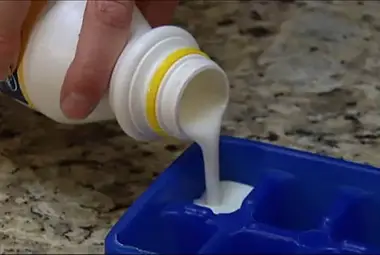Does Glue Freeze
What happens to glue when it freezes, and how can you use it? Does the adhesive still work?
Some people keep glue in the fridge or freezer to extend its shelf life. All glues will freeze at a certain temperature. The chemical structure of glue can affect the results.
Read the blog to answer all your doubts!
Does Glue Freeze?
Many adhesives, including glue, are designed to resist freezing temperatures but many don’t and they tend to freeze in different freezing temperature depending on their chemical composition and freeze resistance properties. Extreme cold temperatures may cause some adhesives to become brittle and, therefore, less effective. Testing your glue before using it in a cold environment is essential to ensure it works.
Store glue in a dry, cool place to avoid it freezing. You can store the glue in an airtight box to further protect the glue from the different elements. Keep water-based glue away from moisture. This can cause it to freeze.
You may be able to use your glue if it has frozen. However, the freezing process could damage the adhesive. Place the container of frozen glue in a warm place until it melts. Test the adhesive after it is thawed to ensure it is still working. If the bond is not working, you’ll have to buy a new glue bottle if the adhesive is not working.
Most adhesives can withstand freezing temperatures if they are stored properly. It’s best to test an adhesive in cold temperatures before using it.

What type of glue can be frozen?
Most adhesives do not freeze well. The freezing process can damage delicate ingredients within the glue and make it less effective. Some bonds can be frozen with no problems.
Super glues and cyanoacrylate are both designed to resist low temperatures. Therefore, they are ideal for cold weather and for gluing materials exposed to extreme temperatures.
Epoxy adhesives also resist freezing. These strong adhesives can be applied to various materials, including glass, metal, and plastic.
Hot glue guns also use glue in their liquid form. It can also be reheated easily if it freezes. This makes it an excellent choice for bonding a variety of materials.
Things you need to know about different types of glue
Synthetic glue is made of different chemicals.
Let’s have a look at the most popular types of household glue:
White Elmer’s Glue- Also known as PVA adhesive. The process involves a series of chemical reactions that involve various chemical components, including polyvinyl acetate, water, acetone, and ethanol.
Water modifies the consistency of the glue and keeps it liquid, while other chemical components determine how quickly the glue dries.
Gorilla Glue- This is one of the most powerful types of glue and is completely waterproof. The main component is a polyurethane chemical compound. It also contains diphenylmethane-diisocyanate, isomers, and homologs. It is fast drying and can be applied to various surfaces, including metal, stone and wood, ceramics, and foam.
Super Glue- Crazy Glue is another name for it. It mainly comprises a chemical called cyanoacrylate, which allows it to adhere quickly and strongly to various surfaces. The glue molecules need to react on a surface with some moisture to bond.
What is the freezing point of glue?
The freezing point is the temperature at which the glue solidifies or crystallizes. The glue’s chemical composition is the main factor.
- PVA glue is made up of water that freezes at 0degC (32degF).
- Gorilla Glue is made of polyurethane, which can freeze at -60degC.
- Superglue containing cyanoacrylate freezes at -80degC (-112degF).
Does it matter if wood glue freezes?
Wood glue can be frozen and then thawed and reused. Wood glue can become unusable after five attempts. When not in use, wood glue should be kept in a warm place or inside your home.
Wood adhesives can be difficult to work with and store in freezing temperatures. It has many solvents and additives to ensure that wood glue flows and dries as expected. These components can include surfactants and other ingredients that help the oil and water mix together.
Water crystals can break when temperatures are extremely low or freezing. They distort the original structure of the molecules that make up surfactants. It can affect the consistency of glue.
Stir the glue
Stirring the glue can restore its original consistency, depending on the type and extent of the freezing. When the glue is frozen slightly, it can be stirred and used.
You can buy new glue if you want to test it first. Check the glue’s consistency and if it works after stirring.
In some cases, the glue will regain its original consistency but may not perform as well. Testing it before using it on a sensitive project is always a good idea.
Freeze/Thaw cycles
Many wood adhesives on the market can only survive five freeze-and-thaw cycles.
Allow the glue to warm at room temperature, then stir. Continue to stir until you see a difference in consistency and color.
If the glue has turned into cottage cheese, it was likely frozen too long. It should be thrown away. If the glue regains its original color, it can be used.
Check the consistency of your glue. It may be possible to use it if it has a uniform consistency. If it is still lumpy after stirring the glue, discard it.
What is the problem with freezing glue?
The chemical composition of glue determines the effect that freezing can have on it.
Water is added to PVA glue to act as a solvent and keep it liquid until you are ready to use it. The water in PVA glue will evaporate over time as it is exposed to the air. This allows the adhesive components to form a strong bond to the surface.
The solvent in PVA glue will solidify first before the adhesive components. The solvent and adhesive will separate, then solidify, forming an unusable clump.
Some glues, such as polyurethane-based and cyanoacrylate-based cyanoacrylate-based glue, can be made with only one adhesive ingredient. These types of glues have a lower freezing point. The glue will be less reactive and cure slower when frozen.
How To Unfreeze Adhesive?
It is easy to unfreeze glue by exposing it to high heat. You must make sure the glue container does not melt.
How to do it?
- Pour boiling water into a large container, then place the frozen glue container until it is completely submerged.
- Let the glue container soak in water for 10 to 15 minutes before removing it.
- If the glue has melted, wait until the container feels cool.
- If you don’t get the glue to melt the first time, heat it again and repeat the steps until the glue returns to liquid.

Tips and Tricks to Avoid Glue from Freezing
- Store glue in an airtight, cool, and dry area.
- If you use a water-based adhesive, keep the adhesive away from moisture.
- Place the container into a warm area until the glue melts to thaw the frozen adhesive.
- Test the adhesive after it has thawed to ensure it is still effective.
Frequently Asked Questions
How long does it take for glue to freeze?
The environmental conditions determine how long it takes for the glue to freeze. The lower the temperature is, the quicker the glue will freeze. Other factors, such as humidity, can also be a factor. You would have to conduct some experiments to find out the freezing point of glue.
Can You Freeze Gorilla Glue?
Gorilla glue is made of cyanoacrylate, which is a quick-acting adhesive. It forms a bond when it comes in contact with moisture. Therefore, it is difficult to freeze the gorilla glue as it destroys its adhesive properties.
What Are the Signs Your Adhesive Liquid Has Frozen Up?
You can tell whether your liquid adhesive is frozen in several different ways. Check the temperature of your adhesive. The adhesive’s temperature will be below freezing if the bond is frozen. You can also check the consistency of the glue.
Does Gorilla glue dry faster in the refrigerator?
Certain types of glue, like polyurethane, dry faster when heated. Hot glues cool quickly and harden as they cool. Putting them in the freezer or using compressed air to blast them could speed up this process. They usually harden quickly without any extra help.
Can you freeze animal-based glue?
Animal-based glue can be frozen, but it will become damaged and useless. Animal-based glues contain a protein called collagen, which is also found in connective tissues and various body parts. The collagen breaks down when frozen and loses its adhesive properties and flexibility.
Does wood glue still work after freezing?
The consistency of white and yellow wood adhesives can change after heating but can be returned to its creamy state by kneading. White and yellow glues are water-based and will freeze below 32 deg F. However, they will not be affected when brought back to room temperature.

Being associated with art and craft field since decades as a hobbyist and life long learner has given me an opportunity to learn many new things related to art, craft, paints and pottery which i am trying to share with your guys on this website. I have expertise of being professional painter and potter for the last 20+ years
I have learned mind blowing cool tips and insights which makes me a person with ability to improvise and come up with creative ideas and solutions to make stunning and impeccable art pieces of all types which are adored by people across the globe on this website and other platform.


